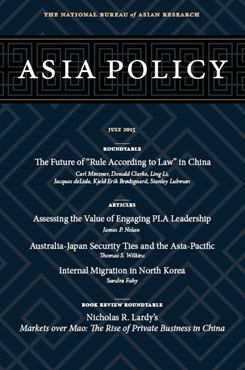Assessing the Fourth Plenum of the Chinese Communist Party
Personnel Management and Corruption
This essay is part of the roundtable “The Future of ‘Rule According to Law’ in China.”
Kjeld Erik Brødsgaard is Professor and Director of the China Policy Programme at the Copenhagen Business School.
T he annual plenary sessions of the Central Committee of the Chinese Communist Party (CCP) usually follow a fixed pattern. The first plenary session of a newly elected Central Committee appoints the new party leadership, including the new general secretary of the CCP. The second plenary session, held in the spring before the annual meeting of the National People’s Congress (NPC), reviews and approves the composition of the new government. The third plenary session addresses basic issues and the party’s policy directions on economic development and reform. The fourth plenary session usually includes party building at the top of the agenda, while the fifth plenary session deliberates on a draft of the upcoming five-year plan that is formally adopted at the annual meeting of the NPC. The sixth plenary session often focuses on cultural themes and broad societal goals such as creating a “harmonious society” or adhering to the concept of “scientific development.” The seventh plenary session, held a few weeks before the opening of the next National Party Congress, approves the agenda of the event as well as the various reports to be presented to the party congress.
Although the fourth plenary session usually discusses party building, law and legal work were the main topics at this meeting in 2014. The result was a major document entitled “Decision of the CCP Central Committee Concerning Some Major Questions in Comprehensively Moving Governing the Country Forward According to the Law” (henceforth referred to as the Decision). [1] This document should be regarded as an extension into the legal area of the ambitious reform proposals adopted at the third plenary session in November 2013. [2] According to some scholars and observers, these proposals are perhaps indicative of the most far-reaching reform initiative since the landmark Third Plenum in December 1978 that inaugurated the post-Mao reform process. [3]
This essay will first discuss the nature and importance of party documents in China. Second, it analyzes the impact of the Fourth Plenum Decision on personnel management in the legal system, arguing that a recentralization of power and authority is taking place. Third, the essay briefly examines the ongoing anticorruption campaign. Finally, it concludes by arguing that recent legal reforms do not intend to reduce the party’s power and instruments of control. On the contrary, the leading role of the CCP is regarded by the Chinese leadership as a necessary precondition for legal reform.
Endnotes
[1] “Zhonggong zhongyang guanyu quanmian tuijin yifa zhiguo ruogan zhongda wenti de jueding” [Decision of the CCP Central Committee Concerning Some Major Questions in Comprehensively Moving Governing the Country Forward According to the Law], Xinhua, October 28, 2014, http://news.xinhuanet.com/politics/2014-10/28/c_1113015330.htm.
[2] “Zhonggong zhongyang guanyu quanmian shenhua gaige ruogan zhongda wenti de jueding” [CCP Central Committee Decision on Several Major Issues of Deepening Reform], Xinhua, November 15, 2013, http://news.xinhuanet.com/politics/2013-11/15/c_118164235.htm.
[3] Kjeld Erik Brødsgaard and Nis Grünberg, “Key Points of China’s Economic Programme after the Third Plenum of the CPC,” China Report 50, no. 4 (2014): 343–59.
About Asia Policy
Asia Policy is a peer-reviewed scholarly journal presenting policy-relevant academic research on the Asia-Pacific that draws clear and concise conclusions useful to today’s policymakers. Asia Policy is published quarterly in January, April, July, and October and accepts submissions on a rolling basis. Learn more


